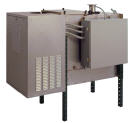Advantages and Applications of Humidification
Hospitals
Indoor air quality is critical to the health and comfort of patients, residents, employees and visitors of hospitals, nursing homes, and other types of healthcare facilities. Poor indoor air quality puts patients, many with compromised immune systems, and healthcare workers, who often spend long hours indoors, at risk from a variety of health threats. According to the CDC, hospital-acquired infections affect approximately 2 million persons annually. Humidity control can be especially important in operating rooms, where modern medical procedures require temperatures as low as 64 to 68 degrees.
Industrial Facilities
Dry air can damage delicate high-tech equipment and electronics. It also contributes to static electricity, which can negatively impact computers and laboratory equipment and create a dangerous situation if potentially explosive gases are present.
Commercial and retail buildings
Proper humidity is also an important factor in the comfort of building occupants. Dry air feels cooler, even at warmer thermostat (bulb) temperatures, and moist air feels warmer at lower thermostat temperatures.
Humidification can improve comfort and decrease manufacturing problems by adding moisture to a dry building environment. The following case study demonstrates what happens when gas technologies are applied to real-world situations.
The following case studies require Adobe® Acrobat® Reader which is available here.
Breathing comfort with lower costs – Brentwood Hi-Rise, MN
Payback of just a few months makes natural gas humidifiers an economical alternative to electric units.

Natural gas humidification offers these important advantages:
- Inhibit growth of disease-causing microbes
- Alleviate environmental antagonism of asthma and allergy-related illnesses
- Contribute to health and comfort of building occupants
- Reduce employee absenteeism and increase employee productivity
- Protect expensive equipment and furnishings
- Reduce energy costs
- Cost-effective alternative where no boiler exists.
- Eliminate dangers of static electricity
- Prevent damage to computers and other moisture-sensitive equipment
- Allows HVAC system to operate at maximum efficiency
- Ensures more precise temperature and humidity control
